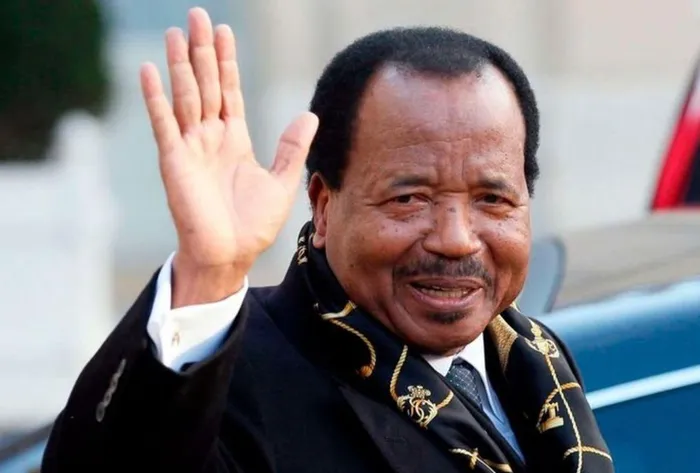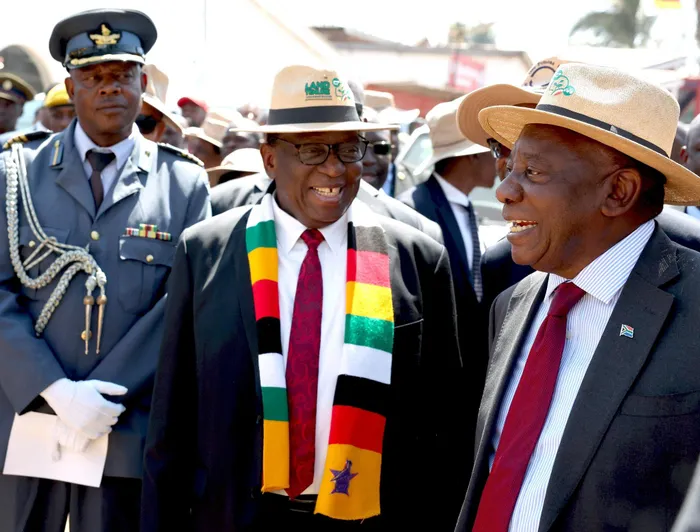
Born on 13 February 1933, Cameroon's President Paul Biya, 92, has been re-elected for an eighth term with 53.7% of the vote, according to official results announced by the Constitutional Council.
Image: Les Echos
At 92, Paul Biya (born Paul Barthélemy Biya'a bi Mvondo) has secured another seven-year term as president of Republic of Cameroon — a victory that extends his rule into its fifth decade and could see him remain in power until the age of 99.
The African Union Commission (AUC) has congratulated Biya on his re-election but coupled its message with a pointed appeal for national dialogue, following reports of violence, repression, and arrests in the aftermath of the 12 October 2025 vote.
“The chairperson extends congratulations to His Excellency Paul Biya on his victory, as the re-elected President of the Republic of Cameroon,” AUC Chairperson Mahmoud Ali Youssouf said in a statement.
“However, the chairperson is gravely concerned about the reported violence, repression and arrests of protesters and political actors in connection with the election results.”
The AU leader called on Cameroon’s institutions and political class to exercise restraint and prioritise “inclusive national dialogue and consultation with all political stakeholders in the spirit of national unity, peace and collective security.”
He reaffirmed the African Union’s commitment to support Cameroon “in the quest to consolidate democracy, social justice and the rule of law.”
Biya’s victory, officially confirmed by the Constitutional Council, gives him 53.66 percent of the vote, ahead of main challenger Issa Tchiroma Bakary, who garnered 35.19 percent, according to official tallies.
It marks Biya’s eighth term since he first took office in November 1982 — a tenure spanning nearly every major phase of modern African history, from the Cold War and apartheid’s collapse to the rise of the smartphone.
At the end of his current term in 2032, Biya will be 99 years old, making him the world’s oldest sitting president and among the longest-serving leaders in modern history.
When Biya assumed power, Michael Jackson’s Thriller was topping global charts and most of today’s Cameroonian youth had yet to be born. Today, the country’s median age is just 18, highlighting an extraordinary generational gulf between ruler and ruled.
Biya’s re-election underscores a broader continental trend: the persistence of aging leaders in countries with overwhelmingly youthful populations.
He joins the ranks of Teodoro Obiang Nguema, 83, of Equatorial Guinea; Yoweri Kaguta Museveni, 81, of Uganda; and Denis Sassou Nguesso, 81, of the Republic of Congo (also known as Congo-Brazzaville); Alassane Ouattara, 83, of Ivory Coast (Côte d'Ivoire); Emmerson Dambudzo Mnangagwa, 83, of Zimbabwe; Bola Ahmed Tinubu, 73, of Nigeria; Joseph Boakai, 80, of Liberia; Jean-Lucien Savi de Tové, 86, of Togo; and South Africa's Cyril Ramaphosa aged 72.

President Cyril Ramaphosa with President Emmerson Dambudzo Mnangagwa of Zimbabwe.
Image: GCIS
Critics say this pattern reflects entrenched personal rule and weak institutions, while supporters argue that such continuity and maturity provide stability in volatile regions.
Reports from major cities, including Yaoundé, Douala and Bamenda indicate protests erupted after the results were announced, with some demonstrations turning violent. Opposition leaders have alleged fraud and vote manipulation, charges the government denies.
International observers have expressed concern about limited transparency and restricted opposition activity during the campaign.
The AU’s call for calm appears aimed at preventing further escalation in a country already facing armed conflict in its English-speaking regions and sporadic violence from Boko Haram in the north.
Over the years, Biya’s health and visibility have become subjects of intense speculation. He rarely makes public appearances and is often reported to spend long periods abroad, particularly in Switzerland.
Critics accuse him of governing “by remote control” through a small inner circle. The opacity surrounding decision-making has also fueled fears of uncertainty over succession, should he become incapacitated during his term.
The African Union’s carefully worded statement reflects the organisation’s diplomatic tightrope: acknowledging a member state’s electoral process while signalling discomfort over democratic backsliding.
While the AU rarely criticises long-serving leaders directly, its inclusion of terms like “repression” and “inclusive dialogue” indicates awareness that Biya’s continued rule — at his age and amid growing discontent — poses a challenge not only for Cameroon but for the AU’s own credibility on democracy and governance.
For many Cameroonians, Biya’s re-election feels less like renewal and more like permanent incumbency. In a country where young people make up more than 60 percent of the population, the symbolism of a 92-year-old leader securing another seven years in power speaks volumes about the generational stagnation of African politics.
As the AU urges dialogue and peace, the question looming over Cameroon is whether the world’s oldest president can still speak to the aspirations of the world’s youngest continent — or whether time itself has become his greatest opponent.
jonisayi.maromo@iol.co.za
IOL News